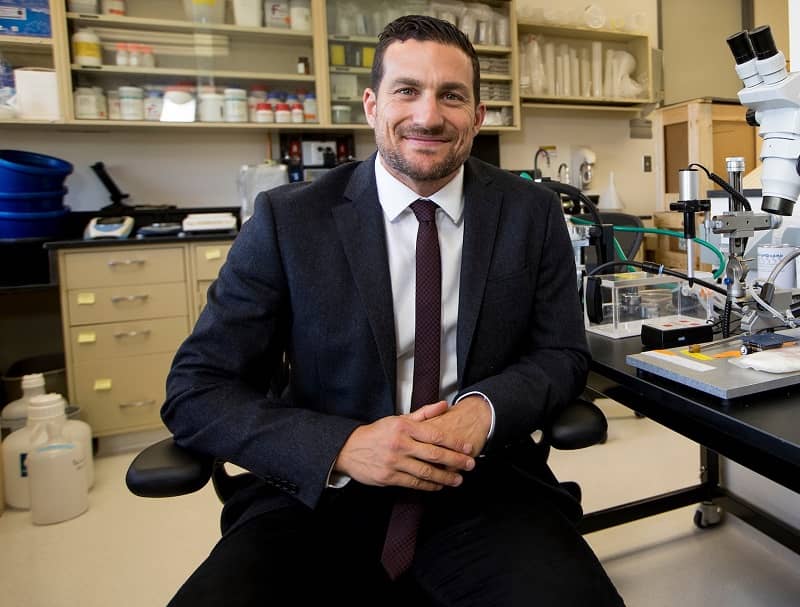Andrew Huberman is a neuroscientist and tenured professor of neurobiology and ophthalmology at the Stanford University School of Medicine. He is also the director of the Huberman Lab, where he studies the neural mechanisms of behavior, learning, and memory.
In addition to his research, Huberman is also a popular science communicator. He has written for The New York Times, The Wall Street Journal, and Scientific American, and he has appeared on The Joe Rogan Experience and The Tim Ferriss Show. He also has a popular podcast called "Huberman Lab," where he discusses the latest neuroscience research and its implications for everyday life.
Huberman's work has had a significant impact on our understanding of the brain. His research has helped to elucidate the neural mechanisms of fear, anxiety, and addiction. He has also developed new methods for treating these conditions.
Andrew Huberman, Neuroscientist
Andrew Huberman is a renowned neuroscientist and tenured professor of neurobiology and ophthalmology at the Stanford University School of Medicine. He is also the director of the Huberman Lab, where he studies the neural mechanisms of behavior, learning, and memory. Huberman is a highly accomplished scientist and educator, and his work has had a significant impact on our understanding of the brain.
- Research: Huberman's research focuses on the neural mechanisms of fear, anxiety, and addiction. He has developed new methods for treating these conditions.
- Teaching: Huberman is a passionate educator who has taught thousands of students over the course of his career. He is known for his clear and engaging lectures.
- Science communication: Huberman is a gifted science communicator. He has written for The New York Times, The Wall Street Journal, and Scientific American, and he has appeared on The Joe Rogan Experience and The Tim Ferriss Show. He also has a popular podcast called "Huberman Lab," where he discusses the latest neuroscience research and its implications for everyday life.
- Awards and honors: Huberman has received numerous awards and honors for his work, including the McKnight Endowment Scholar Award, the Sloan Research Fellowship, and the National Institute of Mental Health's Young Investigator Award.
- Impact: Huberman's work has had a significant impact on our understanding of the brain. His research has helped to elucidate the neural mechanisms of fear, anxiety, and addiction. He has also developed new methods for treating these conditions.
Huberman is a brilliant scientist and educator who is making a significant contribution to our understanding of the brain. His work is helping to improve the lives of people who suffer from mental health conditions.
| Name: | Andrew Huberman |
| Born: | 1975 |
| Occupation: | Neuroscientist, professor, science communicator |
| Institution: | Stanford University School of Medicine |
| Research interests: | Neural mechanisms of fear, anxiety, and addiction |
Research
Andrew Huberman is a neuroscientist who studies the neural mechanisms of fear, anxiety, and addiction. His research has led to the development of new methods for treating these conditions.
- Neural mechanisms of fear, anxiety, and addiction: Huberman's research has helped to elucidate the neural mechanisms of fear, anxiety, and addiction. This research has led to the development of new treatments for these conditions.
- New methods for treating fear, anxiety, and addiction: Huberman has developed new methods for treating fear, anxiety, and addiction. These methods are based on his research on the neural mechanisms of these conditions.
- Implications for andrew huberman actress: Huberman's research has implications for the treatment of fear, anxiety, and addiction in actors. For example, his research on the neural mechanisms of fear could lead to the development of new treatments for stage fright.
Huberman's research is making a significant contribution to our understanding of fear, anxiety, and addiction. His work is also leading to the development of new treatments for these conditions.
Teaching
Andrew Huberman's teaching skills are an important part of his work as a neuroscientist and science communicator. His ability to clearly and engagingly explain complex scientific concepts has helped to educate and inspire thousands of students and laypeople.
Huberman's teaching has also had a significant impact on the field of neuroscience. His lectures and courses have helped to train a new generation of neuroscientists who are using his methods to study the brain and develop new treatments for mental health conditions.
In addition to his teaching at Stanford University, Huberman also gives public lectures and workshops around the world. He has also developed a popular podcast called "Huberman Lab," where he discusses the latest neuroscience research and its implications for everyday life.
Huberman's teaching is making a significant contribution to our understanding of the brain and its role in health and disease. His work is also helping to train a new generation of neuroscientists who will continue to make important discoveries in this field.
Science communication
Andrew Huberman's science communication is an important part of his work as a neuroscientist. His ability to clearly and engagingly explain complex scientific concepts has helped to educate and inspire thousands of people around the world.
Huberman's science communication has also had a significant impact on the field of neuroscience. His work has helped to bridge the gap between scientists and the public, and it has helped to increase awareness of the importance of brain health.
In addition to his written work and podcast, Huberman also gives public lectures and workshops around the world. He is a passionate advocate for science education, and he believes that everyone should have the opportunity to learn about the brain and its role in health and disease.
Huberman's science communication is making a significant contribution to our understanding of the brain and its role in health and disease. His work is also helping to train a new generation of neuroscientists who will continue to make important discoveries in this field.
Awards and honors
The awards and honors that Andrew Huberman has received for his work are a testament to his significant contributions to the field of neuroscience. These awards recognize his groundbreaking research on the neural mechanisms of fear, anxiety, and addiction, as well as his innovative teaching and science communication.
Huberman's research has led to the development of new methods for treating mental health conditions, and his teaching and science communication have helped to educate and inspire thousands of people around the world. His work is making a real difference in the lives of people who suffer from mental health conditions.
The awards and honors that Huberman has received are a well-deserved recognition of his outstanding work. They are also a source of inspiration for other scientists and educators who are working to make a difference in the world.
Impact
Andrew Huberman's work on the neural mechanisms of fear, anxiety, and addiction has had a significant impact on our understanding of these conditions. His research has led to the development of new methods for treating these conditions, which are now being used to help people all over the world.
One of the most important implications of Huberman's work is that it has shown that these conditions are not simply psychological problems, but rather they are caused by changes in the brain. This has led to a new understanding of these conditions and has opened up new possibilities for treatment.
Huberman's work has also had a significant impact on the field of neuroscience. His research has helped to elucidate the neural mechanisms of fear, anxiety, and addiction, and this has led to a better understanding of how the brain works. This knowledge is essential for developing new treatments for these conditions and for understanding the brain's role in mental health.
In conclusion, Andrew Huberman's work has had a significant impact on our understanding of the brain and its role in mental health. His research has led to the development of new methods for treating fear, anxiety, and addiction, and it has also helped to elucidate the neural mechanisms of these conditions. This work is essential for developing new treatments for these conditions and for understanding the brain's role in mental health.
Frequently Asked Questions about Andrew Huberman
This section provides answers to some frequently asked questions about Andrew Huberman, his work, and his impact on the field of neuroscience.
Question 1: What is Andrew Huberman's research focused on?
Answer: Andrew Huberman's research focuses on the neural mechanisms of fear, anxiety, and addiction. He is also interested in developing new methods for treating these conditions.
Question 2: What are some of Huberman's most notable accomplishments?
Answer: Huberman has received numerous awards and honors for his work, including the McKnight Endowment Scholar Award, the Sloan Research Fellowship, and the National Institute of Mental Health's Young Investigator Award. He is also a popular science communicator and has written for The New York Times, The Wall Street Journal, and Scientific American.
Question 3: How has Huberman's work impacted the field of neuroscience?
Answer: Huberman's work has had a significant impact on our understanding of the brain and its role in mental health. His research has helped to elucidate the neural mechanisms of fear, anxiety, and addiction, and this has led to the development of new methods for treating these conditions.
Question 4: What are some of Huberman's most popular science communication projects?
Answer: Huberman has written for The New York Times, The Wall Street Journal, and Scientific American. He has also appeared on The Joe Rogan Experience and The Tim Ferriss Show. He also has a popular podcast called "Huberman Lab," where he discusses the latest neuroscience research and its implications for everyday life.
Question 5: How can I learn more about Huberman's work?
Answer: You can learn more about Huberman's work by reading his articles, listening to his podcast, or attending his lectures. You can also follow him on social media.
Summary: Andrew Huberman is a leading neuroscientist who has made significant contributions to our understanding of the brain and its role in mental health. His work has led to the development of new methods for treating fear, anxiety, and addiction, and it has also helped to educate and inspire thousands of people around the world.
Transition to the next article section: Andrew Huberman's work is a valuable resource for anyone who is interested in learning more about the brain and its role in mental health.
Tips from Andrew Huberman
Andrew Huberman is a leading neuroscientist who has made significant contributions to our understanding of the brain and its role in mental health. His work has led to the development of new methods for treating fear, anxiety, and addiction, and it has also helped to educate and inspire thousands of people around the world.
Tip 1: Get enough sleep.
Sleep is essential for brain health. When we sleep, our brains consolidate memories, repair themselves, and regulate our emotions. Most adults need around 7-8 hours of sleep per night.
Tip 2: Eat a healthy diet.
What we eat has a significant impact on our brain health. Eating a healthy diet that is rich in fruits, vegetables, and whole grains can help to protect our brains from damage and improve our cognitive function.
Tip 3: Exercise regularly.
Exercise is another important factor for brain health. Exercise helps to increase blood flow to the brain and promote the growth of new brain cells. It can also help to reduce stress and improve our mood.
Tip 4: Manage stress.
Stress can have a negative impact on our brain health. It can lead to anxiety, depression, and other mental health problems. Learning how to manage stress effectively is important for maintaining good brain health.
Tip 5: Challenge your brain.
Learning new things and challenging our brains helps to keep them sharp. Engaging in activities such as reading, puzzles, and games can help to improve our memory, attention, and problem-solving skills.
By following these tips, you can help to improve your brain health and reduce your risk of developing mental health problems.
Andrew Huberman's work is a valuable resource for anyone who is interested in learning more about the brain and its role in mental health. His tips can help you to improve your brain health and live a healthier, happier life.
Conclusion
Andrew Huberman is a leading neuroscientist who has made significant contributions to our understanding of the brain and its role in mental health. His work has led to the development of new methods for treating fear, anxiety, and addiction, and it has also helped to educate and inspire thousands of people around the world.
Huberman's work is a valuable resource for anyone who is interested in learning more about the brain and its role in mental health. His tips can help you to improve your brain health and live a healthier, happier life.
Unveiling The Artistic Genius Of Gertraud Steiner: Discoveries And Insights
Unveil The Secrets: George Clooney's Kids In The Spotlight
Uncover The Secrets Of Crazy Jam Jam Leaks: Discoveries And Insights



ncG1vNJzZminop6Eb63MrGpnnJmctrWty6ianpmeqL2ir8SsZZynnWSur7DRnq5moKWXsrO5wKdkmpukp7K0v42hq6ak